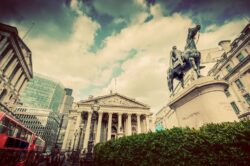Last week, I promised you a trip to the Soviet Union. We’d already been to Japan and China to try and discover what the lockdowns mean for Britain and our investments.
Not that the FTSE 100 index of British stocks agrees with me so far. It is leading markets such as the S&P 500 over the last three months, and by Wednesday it had had its best ever start to the year too.
Meanwhile, Britain is in lockdown and economic forecasts of a recovery are going to have to be adjusted rather dramatically…
Nigel Farage made it clear what he thinks about the stockmarket euphoria amidst the chaos taking place outside of financial markets in this extraordinary video.
And so, today, we turn back to longer term consequences. Where markets will end up, not where they’re bouncing about right now.
It’s not just the pandemic and the lockdowns which will drag down economies during the lockdown era. Governments have taken an unprecedented level of control over our lives too.
Return of the central planners
Whether you agree with the lockdown policies or not isn’t the point I’d like to discuss today. It’s whether governments can do a good job of running our lives to the extent they do now. Whether they have the wisdom to make the right decisions for us.
I doubt it. But that won’t stop them. And so the real question investors should be asking themselves is different again. What are the consequences of giving up management of our lives to politicians?
What happens when they make rules about what we can buy, sell and do? What time we can go to the pub until, which food is a substantial enough meal to make going to the pub permissible, which items are essentials and can therefore be sold during lockdown, when we can take our daily exercise and where, who we can visit, who can and does go bankrupt when and how, who can collect paycheques without working, who can open their business, and which schools stay open.
What happens with this level of interference in our lives from officials?
The good news is, we know the answer to that. It was resolved by the last attempt of governments to control our lives to the extent they do today. You probably know it as socialism or communism…
When my friend and mentor in Australia went back into lockdown recently, he said just that to me – it felt like socialism. This tweet echoed the point:
My husband, whose family came from East Germany, just pointed out to me that this is now worse than living in East Germany before the wall fell.
Dec 19, 2020·Twitter
Vanessa Gray
@VanessaGray999
Now those political ideologies have some rather severe non-economic sides to them. But put those to the side, for a moment at least.
What I’m focusing on here is the central-planning aspect. The direction of economic activity by political leaders. What supposedly benign communism and socialism was supposed to be about. That’s what we have today thanks to Covid-19. In the form of lockdowns, curfews, travel constraints, supermarket controls and plenty more.
So, what do we know about such periods from the past? How do they change economies?
Well, something called the Socialist Calculation Debate raged for most of the last century. Between economists and then politicians, if you can call dictators that.
The key question was whether governments can do a better job of running the economy than the free market. Can a central planner optimise the economy and lives of its citizens better than they can organise themselves? Can they allocate resources well? Is planning better than “chaos”?
You can imagine what most economists and scientists thought…
But the question was of course settled rather conclusively by history. Eventually…
But there’s a part of the debate which I think gives an accurate prediction about our economic future. A part that is very relevant to today. The key fact which settled the Socialist Calculation Debate in favour of the Austrian School of Economics before history did.
The very meaning of economic activity
You see, government planners cannot distinguish between worthwhile economic activity and non-worthwhile. They have no way to measure it. They can only count the amount of economic activity.
This leads to a big mistake: mistaking the amount of economic activity for the key measure, ignoring whether it is worthwhile or not.
In a free market, people go about their business. In a centrally planned economy, nobody knows what business they would go about. And so nobody knows what business should be done. It’s like a ship without a known or knowable destination, where the captain only considers speed. What’s the point?
The trouble is where this leads you over time. If you keep producing lots of unwanted and wasteful GDP that nobody actually wants.
The ability of communists to keep their workers employed seemed to settle the debate about which economic system would be superior about 100 years ago. While capitalism was busy producing hundreds of different brands of toothpaste, the Soviet planner could order the production of just one and then get on with more useful things like the space race.
While capitalist nations had recessions, socialist ones simply decreed for certain levels of economic activity and then delivered them. The wisdom of the official replaced the chaos of the market.
But the inability to produce what is actually wanted by consumers is what eventually leads governments which try to centrally plan the economy astray. Economic activity loses its very meaning.
Mao’s backyard furnace project is the token example. His Great Leap Forward policy resulted in… well a great leap backwards for metal production. And a famine to boot. Farmers were so busy meeting production standards for iron that they melted down the tools they needed to harvest…
When the Soviet Union broke up, it revealed an economy so backward that the divisions continue today. Former East and West Germany being the best example. West Germany still subsidises the East (although this is expected to be mostly abolished in 2021) and by October 2019, the total solidarity payment was 330 billion euros. And East Germany was still lagging far behind…
People living in capitalist economies struggle to even conceive of the problems which centrally planned economies have. Because our economic activity is presumed to be worthwhile, if only in the eyes of the particular person undergoing it. And when they’re wrong, they miss out.
But how do central planners decide how to apportion resources? It’s unknowable for them – the key insight of the Socialist Calculation Debate. And when central planners are wrong, which is inherently all the time because they have no information on what they should be doing, the entire economy goes off the rails.
What does this mean for UK investors today?
With the government exerting unprecedented peacetime controls over our economy, economic activity will gradually lose its meaning too. The satisfaction of needs and wants will no longer be what steers economic activity. It’ll be about goosing statistics with more GDP, regardless of its “quality”, to cover up the damage being done by lockdown policies.
Unproductive enterprises will claim resources to do things which look inexplicable in hindsight. Japan’s bridges to nowhere – that sort of thing. Surpluses and shortages of goods will occur as people fear misguided production and false demand. A lack of entrepreneurship and new business growth will strangle the economy.
Longer term, this means economic productivity falls. And what we actually get out of our economic activity becomes less valuable to us. Our living standards will fall or fall behind, as they did in centrally planned economies.
Meanwhile, inexplicable businesses will be capable of booming, carried along by government vanity projects instead of their own merit. But these will be a giant investment bubble.
The trouble and challenge for investors is that all this can last a very long time before the reckoning.
So, do you participate in the misguided bubble, or do you sit out and wait for the crash? Well, that depends on you. Your risk tolerance, wealth and how much attention you’re willing to pay.
I know which path Nigel Farage and our investment director Rob Marstrand are taking their UK Independent Wealth subscribers on. Find out here.
What’s clear is that these are unusual times…

Nick Hubble
Editor, Fortune & Freedom




